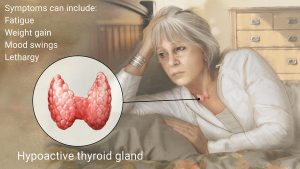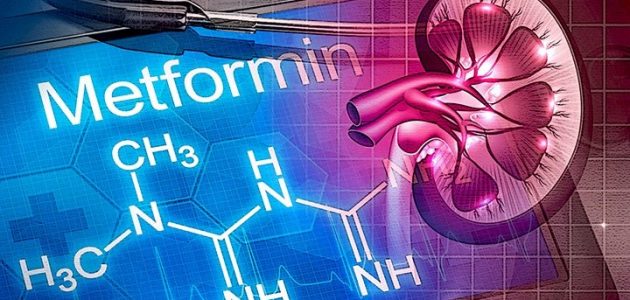Hypothyroidism

What is hypothyroidism?
Hypothyroidism is a disorder that occurs when the thyroid gland does not make enough thyroid hormone to meet the body’s needs. Thyroid hormone regulates metabolism—the way the body uses energy—and affects nearly every organ in the body. Without enough thyroid hormone, many of the body’s functions slow down. About 4.6 percent of the U.S. population age 12 and older has hypothyroidism.
What is the thyroid?
The thyroid is a 2-inch-long, butterfly-shaped gland weighing less than 1 ounce. Located in the front of the neck below the larynx, or voice box, it has two lobes, one on each side of the windpipe. The thyroid is one of the glands that make up the endocrine system. The glands of the endocrine system produce and store hormones and release them into the bloodstream. The hormones then travel through the body and direct the activity of the body’s cells.
The thyroid gland makes two thyroid hormones, triiodothyronine (T3) and thyroxine (T4). T3 is made from T4 and is the more active hormone, directly affecting the tissues. Thyroid hormones affect metabolism, brain development, breathing, heart and nervous system functions, body temperature, muscle strength, skin dryness, menstrual cycles, weight, and cholesterol levels.
The thyroid gland makes two thyroid hormones, T3 and T4. Thyroid hormone production is regulated by TSH, which is made by the pituitary gland in the brain.
Thyroid hormone production is regulated by thyroid-stimulating hormone (TSH), which is made by the pituitary gland in the brain. When thyroid hormone levels in the blood are low, the pituitary releases more TSH. When thyroid hormone levels are high, the pituitary responds by dropping TSH production.
What causes hypothyroidism?
Hypothyroidism has several causes, including:
- Hashimoto’s disease
- thyroiditis, or inflammation of the thyroid
- congenital hypothyroidism, or hypothyroidism that is present at birth
- surgical removal of part or all of the thyroid
- radiation treatment of the thyroid
- some medications
- Less commonly, hypothyroidism is caused by too much or too little iodine in the diet or by abnormalities of the pituitary gland.
Hashimoto’s Disease
Hashimoto’s disease, also called chronic lymphocytic thyroiditis, is the most common cause of hypothyroidism in the United States.1 Hashimoto’s disease is a form of chronic inflammation of the thyroid gland. Hashimoto’s disease is also an autoimmune disorder.
Normally, the immune system protects the body against foreign invaders—such as viruses and bacteria—that can cause illness. But in autoimmune diseases, the immune system attacks the body’s own cells and organs. With Hashimoto’s disease, the immune system attacks the thyroid, causing inflammation and interfering with its ability to produce thyroid hormones.
More information is provided in the NIDDK health topic, Hashimoto’s Disease.
Thyroiditis
Thyroiditis causes stored thyroid hormone to leak out of the thyroid gland. At first, the leakage raises hormone levels in the blood, leading to hyperthyroidism—when thyroid hormone levels are too high––that lasts for 1 or 2 months. Most people then develop hypothyroidism before the thyroid is completely healed.
Several types of thyroiditis can cause hyperthyroidism followed by hypothyroidism:
Subacute thyroiditis. This condition involves painful inflammation and enlargement of the thyroid. Experts are not sure what causes subacute thyroiditis, but it may be related to a viral or bacterial infection. The condition usually goes away on its own in a few months.
Postpartum thyroiditis. This type of thyroiditis develops after a woman gives birth. For more information, see the section titled “What happens with pregnancy and thyroid conditions?”
Silent thyroiditis. This type of thyroiditis is called “silent” because it is painless, as is postpartum thyroiditis, even though the thyroid may be enlarged. Like postpartum thyroiditis, silent thyroiditis is probably an autoimmune condition and sometimes develops into permanent hypothyroidism.
Congenital Hypothyroidism
Some babies are born with a thyroid that is not fully developed or does not function properly. If untreated, congenital hypothyroidism can lead to mental retardation and growth failure. Early treatment can prevent these complications, so most newborns in the United States are screened for hypothyroidism.
Surgical Removal of the Thyroid
When part of the thyroid is removed, the remaining part may produce normal amounts of thyroid hormone, but some people who have this surgery develop hypothyroidism. Removal of the entire thyroid always results in hypothyroidism.
Part or all of the thyroid may be surgically removed as a treatment for:
- hyperthyroidism
- a large goiter, which is an enlarged thyroid that may cause the neck to appear swollen and can interfere with normal breathing and swallowing
- thyroid nodules, which are noncancerous tumors, called adenomas, or lumps in the thyroid that can produce excess thyroid hormone
- thyroid cancer
- Radiation Treatment of the Thyroid
Radioactive iodine, a common treatment for hyperthyroidism, gradually destroys the cells of the thyroid. Most people who receive radioactive iodine treatment eventually develop hypothyroidism. People with Hodgkin’s disease, other lymphomas, and head or neck cancers are treated with radiation, which can also damage the thyroid.
Medications
Some drugs can interfere with thyroid hormone production and lead to hypothyroidism, including
- amiodarone, a heart medication
- interferon alpha, a cancer medication
- lithium, a bipolar disorder medication
- interleukin-2, a kidney cancer medication
What are the symptoms of hypothyroidism?
Hypothyroidism has many symptoms that can vary from person to person. Some common symptoms of hypothyroidism are:
- fatigue
- weight gain
- a puffy face
- cold intolerance
- joint and muscle pain
- constipation
- dry skin
- dry, thinning hair
- decreased sweating
- heavy or irregular menstrual periods and impaired fertility
- depression
- slowed heart rate
However, hypothyroidism develops slowly, so many people don’t notice symptoms of the disease.
Symptoms more specific to Hashimoto’s disease are a goiter and a feeling of fullness in the throat.
Hypothyroidism can contribute to high cholesterol, so people with high cholesterol should be tested for hypothyroidism. Rarely, severe, untreated hypothyroidism may lead to myxedema coma, an extreme form of hypothyroidism in which the body’s functions slow to the point that it becomes life threatening. Myxedema requires immediate medical treatment.
Who is likely to develop hypothyroidism?
Women are much more likely than men to develop hypothyroidism. The disease is also more common among people older than age 60.1
Certain factors can increase the chances of developing thyroid disorders. People may need more regular testing if they:
- have had a thyroid problem before, such as a goiter
- have had surgery to correct a thyroid problem
- have received radiation to the thyroid, neck, or chest
- have a family history of thyroid disease
Have other autoimmune diseases, including:
- Sjögren’s syndrome, characterized by dry eyes and mouth
- pernicious anemia
- a vitamin B12 deficiency
- type 1 diabetes
- rheumatoid arthritis
- lupus, a chronic inflammatory condition
- have Turner syndrome, a genetic disorder that affects females
- are older than age 60
- have been pregnant or delivered a baby within the past 6 months
People should get tested regularly to help uncover thyroid problems—especially subclinical problems. Subclinical means a person has no apparent symptoms.
What happens with pregnancy and thyroid conditions?
Hypothyroidism. During pregnancy, hypothyroidism is usually caused by Hashimoto’s disease and occurs in three to five out of every 1,000 pregnancies.
Uncontrolled hypothyroidism raises the chance of miscarriage, preterm delivery, and preeclampsia—a dangerous rise in blood pressure during late pregnancy.
Untreated hypothyroidism during pregnancy may also affect the baby’s growth and brain development. Thyroid medications can help prevent these problems and are safe to take during pregnancy. Women with hypothyroidism should discuss their condition with their health care provider before becoming pregnant.
Postpartum thyroiditis. This inflammation of the thyroid gland affects about 4 to 9 percent of women in the first year after giving birth.2 Postpartum thyroiditis is believed to be an autoimmune condition and causes hyperthyroidism that usually lasts for 1 to 2 months.
Women with postpartum thyroiditis often develop hypothyroidism before the thyroid gland is completely healed. The condition is likely to recur with future pregnancies.
Postpartum thyroiditis sometimes goes undiagnosed because the symptoms are mistaken for postpartum blues—the exhaustion and moodiness that sometimes follow delivery. If symptoms of fatigue and lethargy do not go away within a few months or if a woman develops postpartum depression, she should talk with her health care provider. If the hypothyroidism symptoms are bothersome, thyroid medication can be given.
More information is provided in the NIDDK health topic, Pregnancy and Thyroid Disease.
2Ogunyemi DA. Autoimmune thyroid disease and pregnancy. emedicine website. http://emedicine.medscape.com/article/261913-overviewExternal Link Disclaimer. Updated March 8, 2012. Accessed February 11, 2013.
How is hypothyroidism diagnosed?
Many symptoms of hypothyroidism are the same as those of other diseases, so hypothyroidism usually cannot be diagnosed based on symptoms alone. With suspected hypothyroidism, health care providers take a medical history and perform a thorough physical examination. Health care providers may then use several blood tests to confirm a diagnosis of hypothyroidism and find its cause:
TSH test. The ultrasensitive TSH test is usually the first test a health care provider performs. This test detects even tiny amounts of TSH in the blood and is the most accurate measure of thyroid activity available. Generally, a TSH reading above normal means a person has hypothyroidism and a reading below normal means a person has hyperthyroidism.
Mildly elevated TSH without symptoms indicates subclinical hypothyroidism. Some health care providers treat subclinical hypothyroidism immediately. Others prefer to leave it untreated but monitor their patients for signs that the condition is worsening.
Health care providers may conduct additional tests to help confirm the diagnosis or determine the cause of hypothyroidism.
- T4 test. This test measures the actual amount of circulating thyroid hormone in the blood. In hypothyroidism, the level of T4 in the blood is lower than normal.
- Thyroid autoantibody test. This test looks for the presence of thyroid autoantibodies. Most people with Hashimoto’s disease have these antibodies, but people whose hypothyroidism is caused by other conditions do not.
More information about testing for thyroid problems is provided in the NIDDK health topic, Thyroid Tests.
How is hypothyroidism treated?
Health care providers treat hypothyroidism with synthetic thyroxine, a medication that is identical to the hormone T4. The exact dose will depend on the patient’s age and weight, the severity of the hypothyroidism, the presence of other health problems, and whether the person is taking other drugs that might interfere with how well the body uses thyroid hormone.
Health care providers test TSH levels about 6 to 8 weeks after a patient begins taking thyroid hormone and make any necessary adjustments to the dose. Each time the dose is adjusted, the blood is tested again. Once a stable dose is reached, blood tests are normally repeated in 6 months and then once a year.
Hypothyroidism can almost always be completely controlled with synthetic thyroxine, as long as the recommended dose is taken every day as instructed.
Eating, Diet, and Nutrition
Experts recommend that people eat a balanced diet to obtain most nutrients. More information about diet and nutrition can be found on the National Agricultural Library website at www.nutrition.govExternal Link Disclaimer.
Dietary Supplements
Iodine is an essential mineral for the thyroid. However, people with autoimmune thyroid disease may be sensitive to harmful side effects from iodine. Taking iodine drops or eating foods containing large amounts of iodine—such as seaweed, dulse, or kelp—may cause or worsen hypothyroidism or hyperthyroidism. More information about iodine can be found in the National Library of Medicine fact sheet Iodine in diet, available at www.nlm.nih.gov/medlineplus/ency/article/002421.htmExternal NIH Link.
Women need more iodine when they are pregnant—about 250 micrograms a day— because the baby gets iodine from the mother’s diet. In the United States, about 7 percent of pregnant women may not get enough iodine in their diet or through prenatal vitamins.3 Choosing iodized salt— salt supplemented with iodine—over plain salt and prenatal vitamins containing iodine will ensure this need is met.
To help ensure coordinated and safe care, people should discuss their use of dietary supplements, such as iodine, with their health care provider. Tips for talking with health care providersExternal NIH Link are available through the National Center for Complementary and Integrative Health.
3Zimmerman MB. Iodine deficiency in pregnancy and the effects of maternal iodine supplementation on the offspring: a review. American Journal of Clinical Nutrition. 2009;89(2):668S–672S.
Points to Remember
Hypothyroidism is a disorder that occurs when the thyroid gland does not make enough thyroid hormone to meet the body’s needs. Thyroid hormone regulates metabolism. Without enough thyroid hormone, many of the body’s functions slow down.
Hypothyroidism has several causes, including:
- Hashimoto’s disease
- thyroiditis
- congenital hypothyroidism
- surgical removal of part or all of the thyroid
- radiation treatment of the thyroid
- some medications
Hypothyroidism has many symptoms that can vary from person to person. Some common symptoms of hypothyroidism are fatigue, weight gain, cold intolerance, constipation, impaired fertility, and depression.
Women are much more likely than men to develop hypothyroidism.
Women with hypothyroidism should discuss their condition with their health care provider before becoming pregnant.
Hypothyroidism can almost always be completely controlled with synthetic thyroxine, as long as the recommended dose is taken every day as instructed.
Clinical Trials
The National Institute of Diabetes and Digestive and Kidney Diseases (NIDDK) and other components of the National Institutes of Health (NIH) conduct and support research into many diseases and conditions.
What are clinical trials, and are they right for you?
Clinical trials are part of clinical research and at the heart of all medical advances. Clinical trials look at new ways to prevent, detect, or treat disease. Researchers also use clinical trials to look at other aspects of care, such as improving the quality of life for people with chronic illnesses. Find out if clinical trials are right for youExternal NIH Link.
What clinical trials are open?
Clinical trials that are currently open and are recruiting can be viewed at www.ClinicalTrials.govExternal Link Disclaimer.
This information may contain content about medications and, when taken as prescribed, the conditions they treat. When prepared, this content included the most current information available. For updates or for questions about any medications, contact the U.S. Food and Drug Administration toll-free at 1-888-INFO-FDA (1-888-463-6332) or visit www.fda.govExternal Link Disclaimer. Consult your health care provider for more information.
This content is provided as a service of the National Institute of Diabetes and Digestive and Kidney Diseases (NIDDK), part of the National Institutes of Health. The NIDDK translates and disseminates research findings through its clearinghouses and education programs to increase knowledge and understanding about health and disease among patients, health professionals, and the public. Content produced by the NIDDK is carefully reviewed by NIDDK scientists and other experts.
The NIDDK would like to thank:
Leonard Wartofsky, M.D., M.A.C.P., Washington Hospital Center; Nabeel Babar, M.D., NIDDK
American Association of Clinical Endocrinologists Handout on Hypothyroidism















